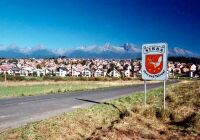ŠTRBA VILLAGE
 The village is situated under the High Tatras mountains.
The village is situated under the High Tatras mountains.
First information about settlement of the village is from the year
1280. The oldest known village name is Corba. The village was founded on wide forrest area
of its owner count Bogomír from Liptov. There were more owners of the village,
e.g. Szentiványi, Szmercsányi and Bán families (three generations of count Bogomír
descendants). The symbols of three foundation families have their signs in the
village heraldry as three stars.
Main jobs of residents was woodcutting,
sheep and cattle raising, pile charring and lime burning.
People there prodecued quality sheep chees and sheepskins.
Later (after the year 1580) the mill and also building of
railroad from Košice to Bohumín (from the year 1871)
gave people the job oppportunities.
The railroad is located near the northern border of village.
There are two demised Middle Aged colonies
in the area of Štrba village - Šoldov and Hrachovisko and
protected natural area Pastierske. In Štrba worked as a teacher
Miloš Janoška (born 1884, died 1963), author of the first Slovak
High Tatras vademecum and propagator of Liptov nature.
There is a clasicistic St. Ondrej Roman Catholic church
in the village. It was build in the year 1848 on the place of older one from 13th
century. In the village there is also an evangelic church build in the year 1784
with the new tower build in 1928.
In present time Štrba is a village, where the traditional wood architecture
was changed by modern family houses, pensions and newly build public buildings
(local council, post office). Last time many of residents work not only in the area of
agriculture, but also in travel agencies, tourism, recreation and related services.
|

